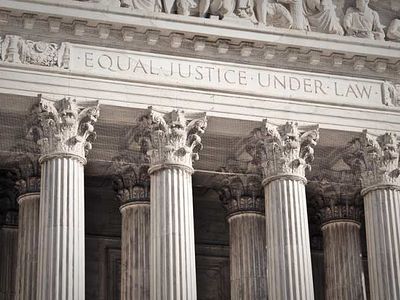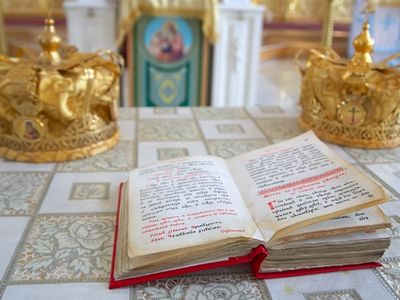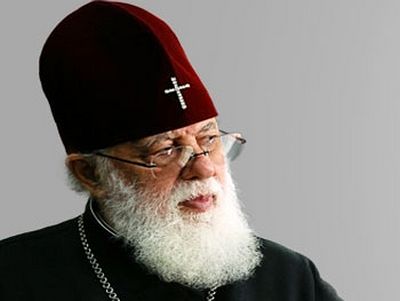On June 26, the U.S. Supreme Court decided to make same-sex marriage a constitutional right in all states, regardless of the religious convictions of each state’s majority population. Some Orthodox Christians may be wondering how this will affect them, and a number of bishops have issued statements to their flock. The response is unanimous, with each contributing his own wisdom. Here are some of them, beginning with the statement by Metropolitan Tikhon of All America and Canada, which includes links to earlier statements and relevant articles posted on the OCA website:
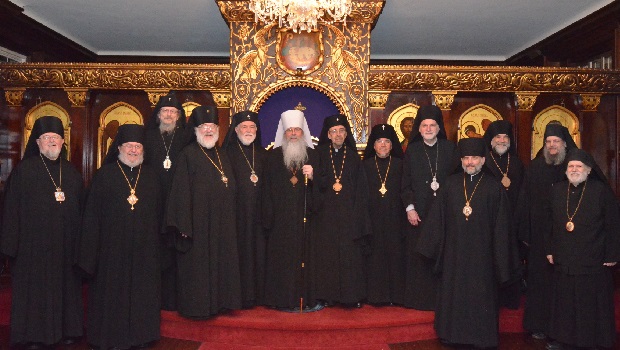
June 28, 2015
To the Venerable Hierarchs, Reverend Clergy, Monastics, and Faithful of the Orthodox Church in America:
Dearly Beloved,
The recent ruling by the US Supreme Court on the legality of “same-sex marriages” has received much press coverage and has already caused some consternation about its implications and ramifications. But we Orthodox Christians must rest assured that the teaching of our Holy Church on the Mystery of Marriage remains the same as it has been for millennia.
Over the past few years, the Holy Synod of Bishops of our Orthodox Church in America has issued a number of statements outlining, detailing and clarifying the teaching of our Holy Faith on this matter in light of challenges from our American society. These teachings remain in effect, in spite of the Supreme Court’s decision. Links to these statements are provided below.
As we reflect on the Supreme Court’s ruling, we should thank Almighty God that we live in a country that allows us the First Amendment rights to worship freely, practice what we believe as Orthodox Christians, and live as examples of Christ our Savior and His love for others.
The ruling does not change the teaching of the Church, but it does remind us of the need to be Christ-like in our dealings with everyone. The state has the responsibility to enact laws that protect the rights of each individual. The Church, while it does not bless “same-sex marriages” or view them as sacramental, does see the image of Christ in every individual, and his or her worth in the eyes of the Lord Who died upon the Cross for our salvation.
As the Orthodox Church in America, it is our responsibility to care for those who are in need, help those who are victims of prejudice, racism or persecution of any kind, and to provide for those who are sick, destitute, homeless or imprisoned.
The Church’s mission continues, and we have a great responsibility to be “all things to all people,” so that we all may be “one in Christ,” and hear on the last day, “Well done, good and faithful servant, you were faithful over a few things, I will make you ruler over many things. Enter into the joy of your Lord” (Matthew 25:21).
With love in the Lord,
+ Tikhon
Archbishop of Washington
Metropolitan of All America and Canada
Statements of the Holy Synod of Bishops of the Orthodox Church in America on the Mystery of Marriage
Encyclical Letter of the Holy Synod of Bishops of the Orthodox Church in America on Marriage
Synodal Affirmation of the Mystery of Marriage
Synodal Affirmations on Marriage, Family, Sexuality, and the Sanctity of Life
OCA Reaffirms SCOBA Statement in Wake of Massachusetts Same-Sex Marriage Ruling
“The Orthodox Faith” - Volume IV - Spirituality Sexuality, Marriage and Family
From the website of the Orthodox Church in America
From His Grace, Bishop Melchisedek, Archdiocese of Pittsburgh and Western Pennsylvania (OCA):
To the Clergy and Faithful of the Diocese of Pittsburgh and Western Pennsylvania:
It is by now common knowledge that the Supreme Court of the United States rendered a decision on Friday, June 26, which declared that marriage between members of the same sex is a constitutional right. This ruling effectively overturned laws in several states which declared such unions to be illegal, and ruled that such unions can be legally performed in all states.
While this ruling marks a significant change in the way that homosexuality is regarded according to the civil statutes, it in no way affects the teaching and practice of the Olthodox Christian Church either in this country or anywhere else in the world. In the interests of clarity, it should be understood that Orthodox Parish Churches are not "Wedding Chapels". Our Churches do not function as places where the sacrament of Holy Matrimony is offered to the public at large on a non-sectarian basis for a fee. Nobody can be married in an Orthodox Church who is not a member in good standing. The qualifications to be a “Member in good standing” have not changed. A member in good standing must be someone who has been properly received into the Church, a faithful believer in the teachings of the Church, a regular participant in the sacraments of Confession and Communion, and gives regular financial and material support to the parish. Persons who do not meet these criteria do not have a blessing to be married in the Church, and no clergy have a blessing to ignore or in any way set aside these criteria.
The Church, following the direct teaching of Jesus Christ, …He which made them at the beginning made them male and female, And said, For this cause shall a man leave father and mother, and shall cleave to his wife: and they twain shall be one flesh? Wherefore they are no more twain, but one flesh. What therefore God hath joined together, let not man put asunder (Matthew 19:4-6), allows for no other form of marriage. Thus anyone who contracts or who has, in the past, contracted such a relationship and does not repent of that relationship, in addition to those who live together in a conjugal relationship without being married are not to be communed.
<…>
Website of the Archdiocese of Pittsburg and Western America (OCA)
Bishop Paul of the Diocese of the Midwest (OCA):
As many of you are aware, on Friday, June 26, 2015, the Supreme Court of the United States of America, issued a 5-4 decision to overturn all bans of same-sex marriage by states and affirmed this union as being a constitutional right. In effect, the court has ruled that same-sex marriages can be legally performed by all states in our country.
As your bishop—and from the perspective of the Church—nothing has changed. Even though same-sex marriage is “legal”, no blessings will be given to any priests to conduct same sex-marriages in our parishes. Those who are in same-sex marriages conducted by their respective states, who are unrepentant, will not be communed.
I would encourage our clergy and faithful to re-read the “Synodal Affirmation on the Mystery of Marriage,” issued by the Holy Synod of Bishops of the Orthodox Church in America exactly two years ago, on June 26, 2013. Likewise, I would urge our clergy and faithful to re-read the 2013 Statement from the Assembly of Canonical Orthodox Bishops of the USA, “On Marriage”.
There is much more I would like to say on this issue, but it seemed good to at least release this brief statement at this time. Meanwhile, I urge our Midwest Diocesan clergy to read and/or distribute the Synodal Affirmation and Assembly Statement in their parishes.
From the website of theMidwest Diocese (OCA)
Archbishop Mark of Philadelphia and Eastern Pennsylvania (OCA):
For God so loved the world that he gave his only Son, that whoever believes in him should not perish but have eternal life. For God sent the Son into the world, not to condemn the world, but that the world might be saved through him. He who believes in him is not condemned; he who does not believe is condemned already, because he has not believed in the name of the only Son of God. And this is the judgment, that the light has come into the world, and men loved darkness rather than light, because their deeds were evil. For every one who does evil hates the light, and does not come to the light, lest his deeds should be exposed. But he who does what is true comes to the light, that it may be clearly seen that his deeds have been wrought in God (John 3:16ff).
Dear beloved clergy and faithful,
The world in which we live today is nothing like the world in which many of us grew up. Whereas many once professed to be Christians and attended Church regularly, today it is no longer the case. Christian values are being rapidly eroded and made an object of scorn through the media. Some faith communities have succumbed to being politically correct rather than faithful to Christ and the Holy Gospel. Our own members sometimes challenge the moral and ethical teaching of the Church. The word Christian historically was used as an adjective to describe the way one lived their life. Today, while some still call themselves Christian they choose to live their lives in a manner contrary to the Gospel delivered once and for all.
Given the recent decision of the Supreme Court legalizing same-sex unions, as well as other similar moral issues related to human sexuality, our Church has not and will not change its theological and pastoral position. I encourage you to read our Holy Synod’s Affirmation on the Affirmation of Marriage on the subject of marriage and human sexuality. Additionally, the Assembly of Canonical Bishops of the United States issued a statement in 2013 On Marriage. By way of reminder, marriage is a Sacrament of the Church and only members in good standing may be married in the Church. No same-sex marriages or unions will be performed in an Orthodox Church or elsewhere by an Orthodox clergyman. That being said, we appear as hypocrites if we are soft on the epidemic of co-habitation, premarital and extramarital relations, but not so with those who fail in their struggle with same sex attraction. St. John Chrysostom says in his Homilies on Romans 1 and 2, that those who fornicate sin against their bodies, whereas those who engage in unnatural relations sin against nature itself. In either case, both need to be restored through the Sacrament of Repentance.
Our Church welcomes everyone who is sincerely seeking the Kingdom of God and desires to live a life of purity and holiness, regardless of their own personal struggles. We all have our own sins. By the Grace of God, we continue to repent daily and struggle to become what the Lord created us to be.
Website of the Diocese of Eastern Pennsylvania,(OCA)
Bishop Thomas (Joseph) Auxiliary Bishop Diocese of Charleston, Oakland, and the Mid-Atlantic (Antiochean Orthodox Archdiocese of America):
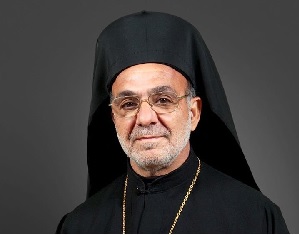
May God bless you always.
On June 26, the Supreme Court of the United States handed down a decision that effectively defines “marriage” as legal
between any two consenting adults throughout our country, regardless of their biological sex, a decision that will no doubt
have sweeping effects in our society, not just for these couples but for children, families, churches, other religious organizations and all people of faith.
This action by the Court attempting to redefine marriage is deeply wrong, but it gives us an opportunity to reiterate for ourselves and also for our whole country the unchanging, timeless teaching of the Holy Orthodox Church regarding marriage and sexuality.
With the creation of marriage by God for Adam and Eve, the first human bond was instituted. This bond preceded all the other social bonds of humanity, including not just governments but even the covenants that He Himself instituted. It is fundamental to human nature that marriage consists of one man and one woman in a lifelong, exclusive bond. Marriage is therefore not about private desire but about the complementary, conjugal bond of family, as created by God and blessed by Him.
It is only within that blessed bond that sexuality finds its proper expression. All other sexual behavior—whether between a homosexual couple, an unmarried heterosexual couple, multiple people, a person by himself, or anything else—is sinful, meaning that it distorts our relationship with God, each other and ourselves. Yet such actions, including their sanction by entering into one of these new legal unions, which are not truly marriages, can always be repented of. No one is a lost cause. No one is our enemy.
Repenting of our sins is what the Church is for. We are all sinners. Even if you do not have one temptation or one sin, you have others. So we do not condemn anyone for any reason. In love and faith, we hold out the hope of salvation through repentance for every human person.
This is the teaching of the Holy Orthodox Church of Christ. It has never changed and can never change, even if it costs us. We will continue to preach and to practice accordingly, and we expect that all of our pastors, teachers and parents will continue to do so. May God give you courage and love as you do so.
Bishop David of Sitka and Alaska (OCA):
As many of you know by now on Friday, June 26th the Supreme Court of our country issued a 5-4 decision to overturn all bans of same-sex marriage by states and affirmed this union as being a constitutional right. In effect the court has ruled, in finality as all decisions of the Supreme Court are, that same-sex marriage can be legally performed by all states in our country.
This does not change the situation for us as Orthodox Christians. We will still uphold the Biblical Standard that Marriage is between one man and one woman, the Supreme Court’s decision does not change that basic truth.
As your bishop, I will give no blessing for any marriage outside of the traditional marriage of one man and one woman. Even though same-sexmarriage is “legal,” there will be no same sex marriages in our parishes. I would encourage you all to re-read the 2013 Statement from the Episcopal Assembly of Bishops on Marriage…
I will say that most arguments against same sex marriage are not strong arguments. Can we deny that those couples do not feel love? Can we say they will make bad parents, or downgrade a community by their presence? The evidence says otherwise. The starting point for any discussion on marriage must begin in the “Sacred Function” Argument. Men and women are given certain “Sacred Functions” that only they can fulfill, when they were created. Those functions are not subjective, but exist in the objective understanding of each person qua person as man or woman.
Archbishop Michael of New York and the Diocese of New York and New Jersey (OCA):
Beloved in the Lord:
Christ is in our midst!
Today we have heard the decision of the Supreme Court of the United States to overturn all bans of same-sex marriages by states. In doing so, it has declared such unions as being a constitutional right. This means that same-sex marriages can be legally performed in all states of our country.
Despite this announcement, nothing has changed the teaching of our Holy Orthodox Church. As hierarchs, clergy and faithful, preserving the Christian Tradition handed down by the Lord Himself, “the faith which was once for all delivered to the Saints” (Jude 3), we re-affirm the meaning of the Mystery of Marriage given to us in His Sacred Scripture:
- 1) God wills that men and women marry, becoming husbands and wives. He commands them to increase and multiply in the procreation of children, being joined into “one flesh” by His divine grace and love. He wills that human beings live within families (Genesis 1:27; 2:21-24).
- 2) The Lord went even further to declare that people who look at others to lust after them in their hearts have “committed adultery” (cf. Matthew 5:27-30).
- 3) Christ’s apostles repeat the teachings of their Master, likening the unique marriage between one man and one woman to the union between Christ and His Church, which they experience as the Lord’s very Body and His Bride (Ephesians 5:21-33; II Corinthians 11:2).
<…>
No matter what the prevailing pressure of the culture or the highest legal court of our land may proclaim, the timeless teaching of the Church echoes the rule of marriage revealed to us by the Lord, written in the Scripture, and re-affirmed by the wisdom and examples of the Saints. Because “we have the mind of Christ” (I Cor. 2:16), no matter what the government or society may say, like St. Peter and the Apostles, “we must obey God rather than men” (Acts 5:29).
Diocese of New York and New Jersey (OCA)
Archbishop Benjamin of San Francisco (OCA):
This morning we received the news that the Supreme Court of the United States asserted the right for persons of the same sex to be married throughout the country. Their decision, however, in no way alters the teaching of the Orthodox Church on the subject of Christian marriage. And, while our doors are open to everyone who seeks the Kingdom of God, our understanding about human persons and the family remains unchanged. There is no blessing for such unions in the Orthodox Church.
<…>
Christian marriage is challenged in many ways in our times. Same sex marriages represent only one such challenge. The common practice of cohabitation, even among those who consider themselves to be Orthodox Christians, is another, and perhaps even more serious, symptom of the denigration of the Sacrament of Holy Matrimony.
As we struggle to uphold and preserve what we have received from the Holy Apostles and Fathers of the Church, let us also show compassion to all our neighbors, not forgetting our calling to make Christ and His love manifest in this place and at this time.
* * *
Other jurisdictions have posted relevant statements concerning same-sex marriage, for example, this one by Rev. Fr. Charles Joanides, Ph.D., LMFT, the Greek Archdiocese of America:
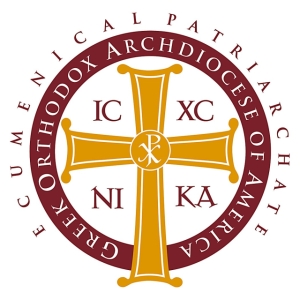
There is an ongoing public discourse taking place which affects public policy, and by extension, all of us. It involves
scholars, our media, political operatives, religious figures and other key influential and knowledgeable persons.
One topic currently being debated within this discourse has the potential to profoundly effect the institution of marriage as we know it. This topic is often referred to as the same-sex marriage debate. Briefly, proponents and opponents are debating the wisdom of granting same-sex partners marital status.
Since we live in a society which affords us input into this vital topic, and since this issue concerns us all, I thought I’d summarize this debate in an effort to facilitate and encourage your participation. I pray that the thoughts that follow will not be misconstrued or hurtful toward any group since this is not my intension. My objective here, is to simply offer information from my own perspective as a Greek Orthodox priest who happens to also be very interested and involved in matters that concern the well-being of marriages and families.
Some Background Observations
In order for us to be equipped to either understand or participate in this debate, we need to understand some of the basic legal thinking that is influencing this debate. And while I am certainly not a lawyer, others whom I have read are, so I will simply condense their thoughts.
As I understand it, the laws pertaining to marriage in our country are profoundly impacted by the following three legal and constitutional assumptions:
First, throughout our country’s history, the concept of consent has had a primary role in influencing court decisions and legislation related to marriage. Since our constitution protects our freedom of choice with regards to lifestyle and belief system, legal experts have historically applied this concept to our right as citizens to choose our life partner.
Second, an equally important constitutional and legal concept relates to our right to privacy. In simple terms, this right permits us to do as we please in our own homes, as long as we are not precluding others from doing the same. When applied to marriage, recent court decisions have decreed that it is not the State’s role to interfere with its citizens’ choice of life partner.
Third, since we live in a multicultural, multiracial, multi-religious society, no single group’s perspective can enjoy a privileged position to the detriment of other groups. When applied to marriage, what this means is that the norms pertaining to marriage are determined through consensus from one like-minded group to another. An example of this is our own Greek Orthodox/Orthodox faith based community. With few variations, those of us who are part of this community, generally construe marriage in a similar way.
A Profound Impact on Marriage
These three presuppositions have had a profound impact on modern marriage. For instance, they helped civil rights proponents successfully challenge and overturn existing laws prohibiting interracial marriage. They would also assist proponents of equal rights for women.
Similarly, the gay and lesbian community is using these legal presuppositions to promote same-sex marriage. An example of this can be observed in what took place in Alaska in 1998. In a Superior Court case, the judge ruled in favor of same-sex marriage, stating that the “right to choose one’s life partner,” is a fundamental privacy right that should receive protection. He further observed that “Government intrusion into the choice of a life partner encroaches on the intimate personal decisions of the individual…. The relevant question is not whether same-sex marriage is so rooted in our traditions that it is a fundamental right…but whether the freedom to choose one’s own partner is so rooted in our traditions.” The outcome of this case is that legislation emerged sanctioning same-sex relationships. Moreover, since this ruling, both Hawaii and Vermont have drafted similar legislation. Other States are expected to follow suit in the near future.
These rulings have prompted Congress to draft and debate what is known as the Federal Marriage Amendment. This amendment would seek to define marriage as a union between “a man and a woman.” Should this amendment pass, States would then have to comply with this standard.
Opponents and Proponents
In effect, these initiatives have intensified this public discourse, differentiating those involved in a discussion of this issue into two camps: those who oppose and those who propose same-sex marriage. In the briefest of terms, here is what both sides are asserting.
Opponents argue that recent court decisions and legislation sanctioning same-sex marriage will further weaken the institution of marriage, especially at a time when we as a nation should be doing all we can to strengthen it.
They further argue that these decisions potentially legitimize other types of live-jn situations and unions. For instance, should those who are promoting same sex marriage succeed, they wonder what would stop others advocating to legitimize polygamous relationships, as well as other more bizarre arrangements.
They maintain that this initiative would further undermine children’s well-being. Supported by reputable research, they assert that children need both biological parents in order to thrive. As such, whenever possible, our nation should be promoting a two- parent, biological family structure.
They further argue that laws have traditionally protected the institution of marriage because marriage has been perceived to be fundamentally important to society’s well-being.
Conversely, proponents favoring same-sex marriage argue that they are not seeking to negatively impact the institution of marriage. They simply desire inclusion and legal legitimacy for same-sex couples. They further argue that because these relationships are not legally sanctioned, people’s constitutional rights are being violated.
Orthodox Holy Tradition
Orthodox tradition - which is based on divinely revealed truths - conceptualizes marriage as a union between one man and one woman. This can clearly be seen in the Book of Genesis (1-2). In these chapters, God creates “the heaven and earth” (Gen 1:1). Then, as a crowning touch, God creates the first couple, Adam and Eve. In effect, this first union functions to legitimize one divinely revealed truth – that the origins of our understanding of marriage are based on an understanding that it is a union between one man and one woman. Moreover, it is through this union that God calls humankind to participate in the procreative process that would fulfill His commission to also “be fruitful and multiply.”
Conclusion
I am not certain how this debate will eventually play out. However, many experts suggest that it is only a matter of time before same-sex relationships – in some form – will be sanctioned. What I am certain about is that we must become more involved in public discourses such as this one.
As a Greek Orthodox faith based community, that has become a part of the diverse tapestry of our country, I believe our voice is important, and should be heard. It is important for two reasons. First, if we truly believe that we have God’s divine truth, then we must seek to share this truth. Second, I believe our sacramental, traditional perspective of marriage contains merit, and should be included in any definition of marriage that is currently being debated. My viewpoint is, that it is time that our perspective be prayerfully amplified and shared, in this and other debates affecting public policy.
